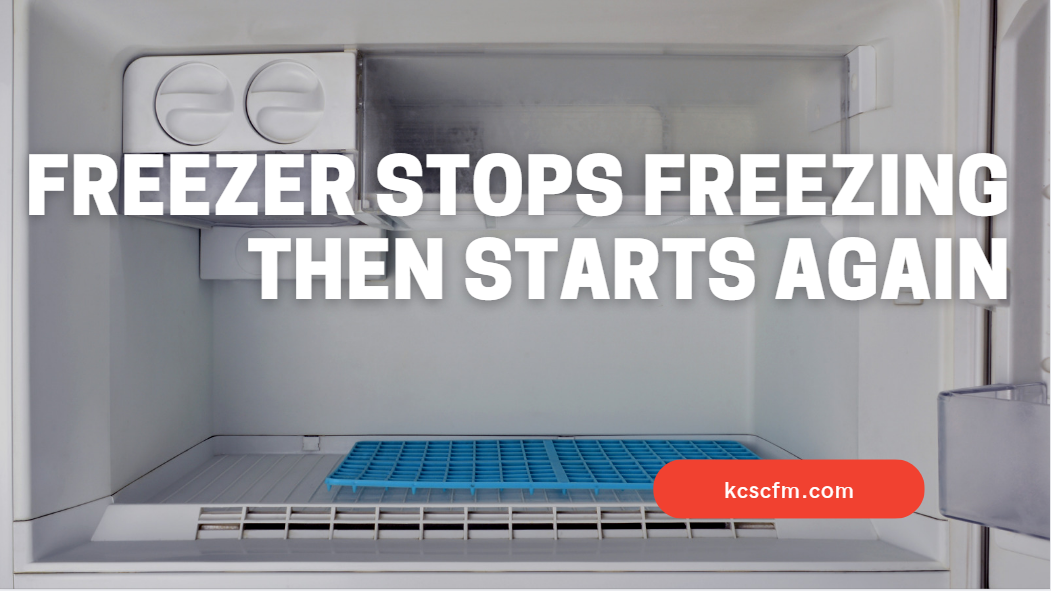Most of us have had the experience at least once in our lifetime when our freezer decides to play a cruel joke on us: one moment it’s freezing like usual, and the next, we open it only to find all of our food thawed out and dripping.
If you’ve ever experienced this frustrating situation, then you know that having your freezer stop freezing can be an incredibly inconvenient event – especially if your cold items start going bad before you can save them! But what do you do when something as extreme as this happens?
Check the fan and the condenser coils for dirt or dust buildup. Clean with a vacuum or soft brush. Check the temperature setting to make sure it is set correctly. Check the door seal to make sure it is not allowing warm air in. Check the evaporator coils for ice buildup. Defrost if necessary.
In this article, we will discuss why freezers freeze and why they sometimes stop working unexpectedly – as well as how to get it back up and running again.
So keep reading if you want answers to those all-important questions about the mysterious inner workings of your trusty refrigerator/freezer unit.
Freezer Stops Freezing Then Starts Again – Causes

If you’ve ever experienced the frustration of reaching into your freezer only to find that your ice cream has turned into a soupy mess, you know how important it is to have a functioning freezer.
Check Out Solution For Freezer Only freezing at Bottom
Unfortunately, freezers are prone to experiencing issues from time to time, and one common problem is when the freezer stops freezing then starts again. This can be a frustrating and inconvenient issue, as it can cause your food to spoil and lead to costly repairs.
There are several potential reasons why your freezer may stop freezing then start again. Some of the most common causes include:
Dirty condenser coils
The condenser coils are responsible for releasing heat from the freezer, and if they become dirty or clogged, it can cause the freezer to stop freezing.
To check the condenser coils, locate them on the back or bottom of the freezer (consult your owner’s manual for specific instructions). If the coils are visibly dirty, use a coil brush or vacuum to remove any dust or debris.
Malfunctioning thermostat
The thermostat regulates the temperature inside the freezer, and if it’s not functioning properly, it can cause the freezer to stop freezing.
To check the thermostat, set it to a lower temperature and see if the freezer starts freezing again. If not, the thermostat may need to be calibrated or replaced.
Low refrigerant levels
The refrigerant is responsible for keeping the freezer cold, and if the levels are low, it can cause the freezer to stop freezing.
To check the refrigerant levels, you’ll need to contact a professional.
Frost build-up in the freezer
Frost build-up in the freezer can interfere with the circulation of cold air, causing the freezer to stop freezing.
To fix this problem, you’ll need to defrost the freezer. Unplug the freezer, remove all the food, and use a hair dryer or a towel soaked in hot water to melt the frost.
Malfunctioning door seal
The door seal helps keep the cold air inside the freezer, and if it’s damaged or not sealing properly, it can cause the freezer to stop freezing.
To check the door seal, close the door on a piece of paper and try to pull it out. If the paper comes out easily, the seal may need to be replaced.
Steps to Troubleshoot and Fix the Problem
If your freezer is experiencing the problem of stopping freezing then starting again, here are some steps you can take to troubleshoot and fix the problem:
Step 1: Check the condenser coils and clean them if necessary. As mentioned above, dirty condenser coils can cause the freezer to stop freezing. To clean the coils, locate them on the back or bottom of the freezer and use a coil brush or vacuum to remove any dust or debris.
Step 2: Check the thermostat and calibrate it if necessary. If the thermostat is not functioning properly, it can cause the freezer to stop freezing. To check the thermostat, set it to a lower temperature and see if the freezer starts freezing again. If not, the thermostat may need to be calibrated or replaced.
Step 3: Check the refrigerant levels and refill if necessary. If the refrigerant levels are low, it can cause the freezer to stop freezing. To check the refrigerant levels, you’ll need to contact a professional.
Step 4: Check for frost build-up and defrost the freezer if necessary. Frost build-up in the freezer can interfere with the circulation of cold air, causing the freezer to stop freezing. To fix this problem, you’ll need to defrost the freezer. Unplug the freezer, remove all the food, and use a hair dryer or a towel soaked in hot water to melt the frost.
Step 5: Check the door seal and replace it if necessary. The door seal helps keep the cold air inside the freezer, and if it’s damaged or not sealing properly, it can cause the freezer to stop freezing. To check the door seal, close the door on a piece of paper and try to pull it out. If the paper comes out easily, the seal may need to be replaced.
Preventative Measures
Taking some simple preventative measures can help ensure that your freezer stays in good working order. Here are a few tips for maintaining a functioning freezer:
Clean the condenser coils regularly: As mentioned above, dirty condenser coils can cause the freezer to stop freezing. To prevent this from happening, be sure to clean the condenser coils regularly.
Check and replace the door seal as needed: The door seal helps keep the cold air inside the freezer, and if it’s damaged or not sealing properly, it can cause the freezer to stop freezing. To prevent this from happening, be sure to check the door seal regularly and replace it as needed.
Don’t overload the freezer: Overloading the freezer can interfere with the circulation of cold air, causing the freezer to stop freezing. To prevent this from happening, be sure not to overload the freezer and leave enough space for cold air to circulate.
Don’t leave the door open for long periods of time: Leaving the door open for long periods of time can cause the freezer to stop freezing, as it allows warm air to enter the freezer. To prevent this from happening, be sure to close the door promptly after accessing the freezer.
Importance of Regular Maintenance
Maintaining a functioning freezer is important for several reasons. A functioning freezer helps keep your food fresh and prevents it from spoiling, which can save you money on groceries.
Additionally, regular maintenance can help extend the lifespan of your freezer and prevent costly repairs down the line.
Conclusion
If your freezer stops freezing then starts again, it can be a frustrating and inconvenient problem. However, by understanding some of the possible causes and taking steps to troubleshoot and fix the issue, you can help ensure that your freezer stays in good working order.
Remember to take some simple preventative measures, such as cleaning the condenser coils and checking the door seal regularly, to help maintain a functioning freezer. And, don’t forget the importance of regular maintenance to extend the lifespan of your appliance and prevent costly repairs.

Hi there! I’m Sam Hendricks, and I’m a repair technician and expert. I created this website to help people like you save money and time by fixing your own appliances.
Over the years, I’ve seen people spend a lot of money on unnecessary repairs or replacements. That’s why I decided to share my expertise and create easy-to-follow guides for fixing appliances on your own.
